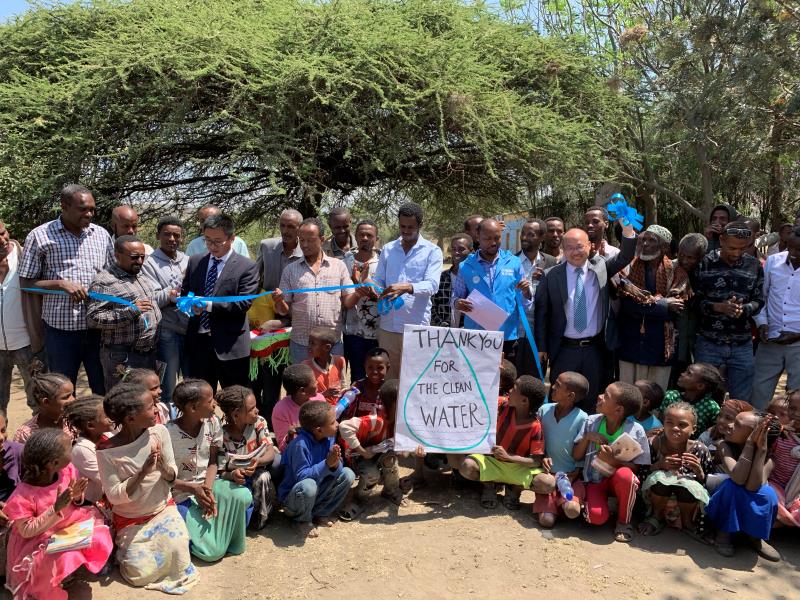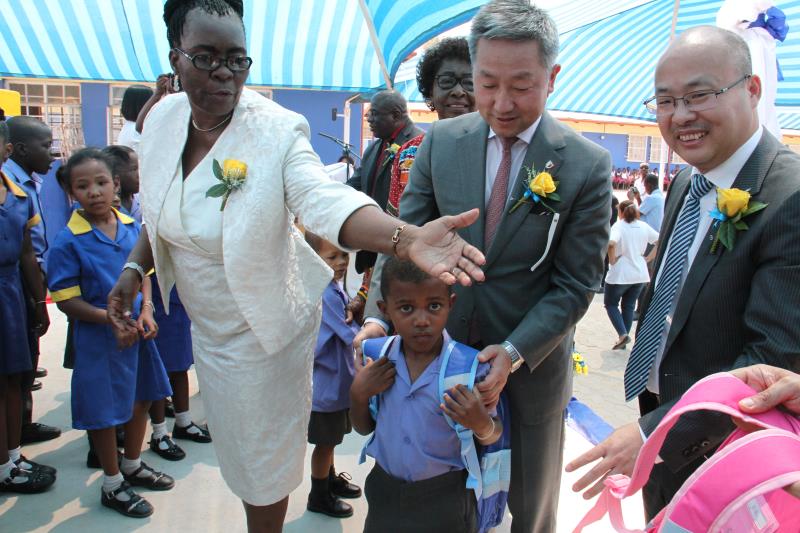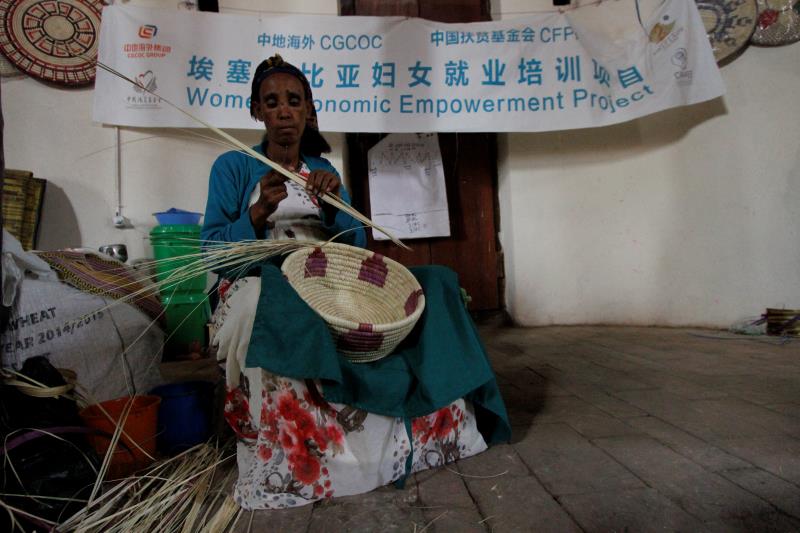Editor’s Note
Mr. Wu Peng is the director of the department of international development of the China Foundation for Poverty Alleviation. Founded in 1989, the CFPA is a charitable organization based in Beijing and professionally supervised by the State Council Leading Group Office of Poverty Alleviation and Development. It runs a wealth of projects both in China and overseas. In the interview that follows, Wu Peng discusses his organization’s work around the world, and the challenges for Chinese civil society organizations that want to work overseas. The interview was carried out by CDB’s Gabriel Corsetti and Yin Qian on the 26th of March 2019 in Beijing. It was conducted partly in English and partly in Chinese, and the Chinese parts have been translated into English.
CDB: The China Foundation for Poverty Alleviation (CFPA) is one of the main Chinese civil society organizations that conducts projects overseas. Could you briefly describe the CFPA’s major overseas projects for our readers?
Wu: The CFPA started its international program in 2005. By 2018, we had raised a total of over 160 million Yuan for overseas aid and projects in over 20 countries and regions. Our fist program abroad was our response to the Indonesian tsunami. Actually disaster relief was always a major part of our international projects, but now the focus of our projects is gradually shifting from focusing only on disaster relief to having an equal emphasis on disaster relief and development aid. We focus mainly on the Sustainable Development Goals 1, 2, 3, 4, 6 and 8: no poverty, zero hunger, good health and wellbeing, quality education, clean water and sanitation, and decent work and economic growth. Since our work focuses on impoverished people and those affected by natural disasters in remote areas, it can be said that all our programs are related to poverty alleviation, so this is our contribution to the first SDG.
When it comes to the second SDG, zero hunger, we have related programs in Sudan, Ethiopia and Cambodia. In Sudan and Ethiopia we implemented the “Smiling Children Project” in 51 schools and three refugee camps, and the number of students to have benefited was over 10,000. The main point was to provide free meals to primary school children in Africa. This was our contribution to the goal of “zero hunger”.
When it comes to good health and wellbeing, we built a hospital in Sudan in 2011. We also implemented a program to screen for hepatitis B in Nepal.
As for quality education, we have many programs in the educational sector within China, and we have also introduced them to other countries. For instance, in Myanmar we have scholarships catering to college, middle and primary school students. In Nepal we have built a school, and we have two under construction. Our biggest educational aid project is the Panda Pack Project (爱心包裹), supported by Alibaba. The project officially started this year in February, and we plan to expand it to 11 Belt and Road countries in 2019. Other than that, in Myanmar’s Dagon University we built a computer lab, and we donated some material to schools in Nepal, including tables and benches and psychological care following the earthquake.
When it come to clean water and sanitation, we built 81 wells for water in Ethiopia, and in Nepal we implemented the WASH program, restoring a lot of water facilities that were damaged during the earthquake, while at the same time training the local women and children to wash their hands before cooking and after using the toilet.
The last SDG we focus on is decent work and economic growth. In Ethiopia we held a program to train local women in skills like weaving, pottery and stone carving, promoting the local society’s development and gender equality, since in Ethiopia even jobs like weaving are mostly done by men. We recruited many women to do such jobs so they could learn the skills and earn some money, realizing their financial independence. This year we started cooperating with UN-women, and fundraised for the program through Tencent Charity and Meituan.

Wu Peng at the celebration for the completion of a well-building project in Ethiopia
CDB: Thank you for your very comprehensive introduction. You mentioned that the CFPA was founded in 1989, but it started going out in 2005. How was the decision made to start operating abroad? Are your projects overseas focused on similar areas as your projects in China?
Wu: As to the questions of why head overseas, and why the CFPA headed overseas, we actually discussed it within our foundation in the past, and I think it can be summed up as a mixture of internal and external factors.
I will start by looking at the external ones: one factor is that China has grown to become the world’s second largest economy, leading to unprecedented investment and foreign travel. As such, China’s contact with the rest of the world has expanded exponentially. This has required not only governmental effort, but also companies, individuals and social organisations to look overseas. Without a doubt, this has become a trend across all types of industries.
Having talked about economic development, the next point is that the Chinese people have a long tradition of being charitable to those less fortunate than themselves. However Chinese people’s charity is different from Western Christianity’s “universal love”, in that it tends to start from what is closest. There is an old Confucian saying: “cultivate oneself, manage one’s family, govern one’s nation and there will be peace throughout the world”. That is to say that as our own capabilities and strength increase, then we will gradually begin to look outward, rather than doing so right from the start. If I am very poor, I cannot turn my concern to disasters in other countries. You must first get your own affairs in order, and once they are moving along well, then you will be able to care for your family. Only after this should you look outside of your family.
The Indian Ocean tsunami in 2005 was an important moment. If you look at the data from the time, you can see that China’s ordinary people donated a lot of money. Of course it wasn’t all given to the Foundation for Poverty Alleviation, we only received a small part. This shows that there was clearly a growing willingness among the people to donate to charity. In wake of the global disasters that followed, for example the Pakistan earthquake, Burma’s typhoon, and Chile’s tsunami, we received many donations.
What’s more we did not take the initiative to push for donations. All we did was to have a long-established Emergency Relief Department for disasters in China, so we had relatively mature mechanisms for disaster response and fundraising, and when there were disasters in other countries we used these mechanisms to fundraise and managed to raise some money. This is one of the reasons that we started working abroad earlier than other organizations.
The second factor is related to the constant increase in the scale of Chinese companies’ outward investment. When these companies invest, they find that the local social situation is very different from China’s. When they encounter issues such as the need to compensate people for losing their land, it is necessary for them to go themselves and enact some projects to give back to the local community. The bigger their investment is, the bigger the need is for the companies to give back to the local community. But since they lack specific competency in this field, they hope that Chinese civil society organization can help them perfect their local CSR projects. Due to this, we are currently co-operating with PetroChina to build hospitals in Sudan, and with the Xugong Group to build wells in Ethiopia.
At the same time, another important factor is that in recent years the Chinese government put forward the idea of building a “community of common destiny for humanity” through the Belt and Road, and so the CFPA going abroad is also a way of actively responding to the government’s policy call.
These are all external factors that have driven the China Poverty Alleviation Foundation to look overseas. What then are the internal factors? I think the internal governance structure of the foundation is one of them. The CFPA completed its marketization reform in 1999, and the organization’s operational method lies mainly in designing programs to respond to social needs and solve social issues, urging us to take the initiative and grasp at the hot issues in society.
Secondly, if we were able to go out of China so early, it was thanks to our leaders’ international perspective, which also fits in with our foundation’s mission that can be summed up as “alleviating humanity’s suffering”, so not just China’s suffering, but all of humanity’s. Since the leaders had this sort of perspective, they realized very early on that China’s social organizations should operate across borders, and that internationalization was an unstoppable trend. We also started preparing well in advance for this step, since internationalization isn’t something that can be achieved on a whim, it requires a long process of development. Only by being well prepared could we grasp this opportunity.

Wu Peng at the launching ceremony of the Namibia Panda Pack Project
CDB: When working overseas, in your experience, what are the main problems and misunderstandings you’ve encountered when you cooperate with the local government and local civil society?
Wu: There are many challenges we have faced when internationalizing. The first problem was being unfamiliar with the customs and habits of the other party, and their laws and regulations. For example, when we built the first hospital in Sudan, a problem at customs clearance led to us having to pay a demurrage charge. Looking back, the main problem was that we hadn’t entirely understood the holiday arrangements of the local government departments and the issue of whether our partners enjoyed tax exempt status or not. Therefore after that we were careful not to send material over during public holidays, and before making a donation we would ascertain in advance with our partners whether it would have tax exempt status.
In view of the above, with the support of the Asia Foundation we produced our “operational manual for Chinese civil society organizations going out”, and we shared some of the most important parts with Chinese civil society organizations, hoping that they will be able to work abroad more smoothly.
The second challenge we encountered are security issues. We Chinese NGOs have to improve our security awareness, related knowledge and preventative measures. Chinese insurance companies still do not offer very good plans specifically for people going abroad to dangerous areas. Although some foreign insurance companies may offer such products, they are rather expensive and the vast majority of Chinese civil society organizations cannot afford them. Then there is the security education for the staff of social organizations who go abroad, for which it may be necessary that some professional third party organizations provide security training.
Furthermore, there is the issue of public awareness. When it comes to Chinese social organizations going abroad, even though public awareness has already improved and critical voices have lessened, creating an atmosphere of public support will still take time. Following the development of China’s economy and the improvement in the people’s living standards, I hope experts, academics and the media can encourage people to take a broad view of the world, and pay attention to the world’s impoverished places and the UN’s SDGs. After all, our China has an excellent tradition of helping the poor.
CDB: The CFPA has currently set up offices in Myanmar and Nepal. What considerations lay behind the decision to create these offices?
Wu: The first consideration is whether you are able to get a work visa. According to some countries’ regulations if you don’t set up an office in the country then you cannot receive work visas, meaning that after a set amount of time your staff have to leave the country and then re-enter, which is troublesome. For instance in Ethiopia we still haven’t completed our registration, so our country director has to fly out and then back in every month.
Secondly, if we don’t register locally, we have no way to accept donations from local donors. Ethiopia, for example, has foreign exchange controls, so local donors can’t donate US dollars to our Chinese headquarters, and their wish is to donate to us in local currency. Since we haven’t registered an office however, we cannot accept donations in local currency.
The third problem is that if we don’t have a legal registration status, then we can’t hire local employees. So these three problems mean we have to register locally. When the scale of the project is small, we can work with local partners to complete the project and registering is not as important. But when the scale is large, and there is an ever increasing number of partners, registering a local office will definitely benefit our work.
Regarding social organizations setting up offices abroad, in 2016 the state released a policy document ruling that social organizations could set up an office abroad after receiving the approval of their PSU. This policy was an answer to the urgent need of social organizations going out, and it made up for a previous gap in the regulations.
CDB: The funding for CFPA’s international projects each year is in the range of about 20 – 30 million. What are the main sources of funding?
Wu: I have not specifically calculated, but I would say that about 90% comes from domestic funding, and about 80% of that comes from funds raised from the public. The rest comes from businesses and foundations. That would be the approximate ratio. As for the money we raise outside the country, it comes from Chinese companies overseas and Chinese embassies. Some of them will directly send their donations to our local account so that it can be used for project operations.
CDB: Do you get local organizations or individuals donating to the CFPA in other countries?
Wu: In terms of raising funds from enterprises or the public in other countries, the CPFA does not really have any obvious strengths. This is mainly because we are still in an embryonic stage. Our strength definitely lies in raising funds within China and going abroad to do projects. Currently the main thing is to decide how best to use the resources we have. In future we can consider trying to fundraise overseas as well. In this sense, when we have a good project we can try applying for funding from the UN and from large foundations.
CDB: What kind of policy or legislative changes do you think could provide the most facilitation for Chinese civil society organizations that want to go out and work abroad?
Wu: The policies are constantly evolving. What was originally focused on the most was the transfer of funds overseas. For us to transfer a donation out of the country used to be quite difficult, but now the process has been simplified and it is no longer such a big problem. On the other hand, with more Chinese social organization going out there will be more and more need to transfer donations abroad, so I suggest that a special channel for donations should be set up amongst the options for transferring foreign currency.
My second suggestion is actually still to do with transferring funds abroad. We hope there can be a clear policy allowing Chinese social organizations to transfer funds directly to a legally established overseas branch organisations, including project expenses and administrative fees.
The third recommendation is that we hope the Chinese government will open up the South-South fund to civil society organizations, and allow them to apply for these funds. This will give a great impetus for Chinese social organizations to go out. The government’s support will act like a propeller, driving social resources in that direction. This way both the public and the enterprises will be able to support social organizations to go out.
 A woman in Ethiopia learning to make baskets as part of a CFPA-run training program
A woman in Ethiopia learning to make baskets as part of a CFPA-run training program



